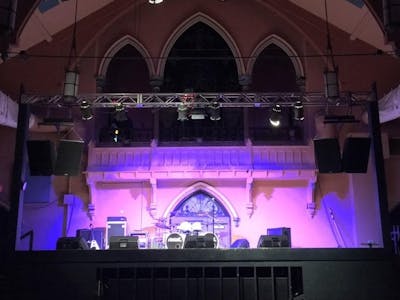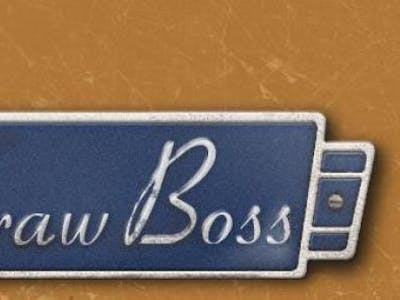Show Details

Lucky Tubb & The Modern Day Troubadors
with:- Rodney & the Regulars
- Straw Boss
- Thursday, March 20, 2014
- The Southgate House Revival (The Revival Room)
- 8pm doors / 8:30pm show
On Hillbilly Fever, his third studio album, Lucky Tubb swings open the musical doors to the honky-tonk to enrich and expand the tradition. With his special guest and pal Wayne “The Train” Hancock, he co-wrote and sings the zesty album closer “West” and duets on the country chestnut title tune. On his songs and others written by uncle Glenn Douglas Tubb, Lucky offers carved from oak true country guaranteed to get listeners dancing as he sings real-life tales with the authority of a man who’s been there and back. Troubadour fiddler Natalie Page Monson wrote and sings “Honky Tonkin’ Is All We’ve Got,” and Tubb amends the set with a bonus track, “Looks Like Rain,” that showcases his bluesy chops and finesse on an impromptu studio composition virtually written as it was laid down that compares to the artistry of Tom Waits.
All told, Hillbilly Fever is a winning and energetic celebration of tried and true country music that promises to keep the real deal alive and kicking for years to come. For as Saving Country Music notes, “Lucky Tubb has that ‘something’ that stars are made of, which can’t be faked or equalized no matter how high the measure of talent.” He also has a life story that plays like the most vivid tales in song from back in the days when country music was all about people, places and lives that were as real as it gets.
And he has indeed lived a life that’s both real and surreal: A childhood bouncing between hardscrabble redneck dirt-poor struggle and family dysfunction with his parents and relative luxury and security with his grandparents. Teen years being raised by a wild pack of wolves, or at least the human equivalent — tough, no nonsense outlaw bikers. Then time in prison as he came of age. And finally redemption and triumph thanks to the strong strain of genetic musical gifts and indestructible willpower that run throughout the Tubb clan.
Born in the Fort Worth area, Lucky was passed off by his parents to his grandparents before he’d even hit the one-year-old mark. Their Tucson home was a haven for the young ‘un as well an am extended family gathering spot where he was surrounded on reunions by the music making and hard drinking that are family traits. Throughout his youth he split his time between there and attempts to live with his mother, a woman with a head full of wild hairs.
At age 14, Lucky decided it was time to get to know his father, who lived well outside the law and usual conventions in Fort Worth. “My Dad’s name is Lefty because he can’t do anything right. My name is Lucky because I didn’t have any,” he notes. When his father began leaving the teenager in barrooms and disappeared for days at a time, Tubb was adopted by a gang of bikers who inducted him into a life of crimes best left unmentioned while at the same time instilling in him their unusual yet still honorable moral code
By 17 he landed in the Texas prison system and experienced the full terrors and troubles of all that goes down behind bars. Undaunted by what might break lesser young men, he still managed to earn his high school diploma and some college credits plus master a trade.
By the time he was freed at 22, Tubb had learned enough to avoid any further life of crime, but also knew he wasn’t exactly cut out for the straight and narrow. An old Black inmate had taught him some rudiments of guitar playing in jail (and paid for it with his life by crossing the strict racial lines in prison). So Tubb decided to try his hand at the family craft of singing, songwriting and making ‘em dance out in the honky-tonks. He credits “God and faith and a lot of dreams” with getting him through his prison time. “I wanted to get out and play music,” he asserts.
“When I got out I had a big chip on my shoulder, and came down to Austin to start working on myself and getting my heart right,” Tubb explains. “I barely knew how to play guitar, much less sing or write songs. I never imagined I’d do shows with Junior Brown much less write a song with Wayne and tour with Hank III — all these people whose CDs I bought to learn how to play guitar to. And now they’re my peers.”
But that’s just what happened, thanks to a wide stroke of good fortune to counter his bad luck streak. Austin eclectic blues rocker Guy Forsyth took Tubb under his wing and tutored him in guitar, songwriting, and making the most of himself and his gifts. He started singing for tips in coffeehouses, and what he sang and how he sang it started to connect with the city’s community of true country fans.
Just as he’d accumulated enough seasoning and songs to be ready to cut an album, Tubb got yet another smack back when he came home on Christmas Eve to find his house had burned down with all his musical instruments and equipment in it. He brushed off the ashes, eventually reacquired gear, and hit the studio with Stevens to cut his debut album, Generations, which set a pattern of mixing his songs with those from the family catalog by uncles Glenn Douglas and Ronnie Wade (Billy Lee Tubb).
He later met Monson and the two started playing gigs in roadhouses in the Texas Hill Country and Austin club shows while building a band around their musical union. A live CD and second studio album, Damn The Luck — hailed as “a fabulous album” by Rockabillyvile — followed as Tubb set out on the road to forge a national following, playing shows with Ray Price and Dwight Yoakam. His audience further expanded when fellow country legend progeny Hank III invited him to open a national tour.
Tubb and his Modern Day Troubadours — Monson, bassist Brent Hazard and guitarist Nick Young — have branded a rep nationwide as a true-to-the-roots honky-tonk band with contemporary verve and cool. And following the release ofHillbilly Fever, they travel for the first time to Europe to play the prestigious Festival Country Rendez-Vous de Crappone in France and thrill Belgium and The Netherlands with the true cross of country music. For as Saving Country Music notes, “’tight’ doesn’t begin to describe the synergy and slickness of their show. I’m telling you, Lucky Tubb and the Troubadours have found their groove, and it’s Katy bar the door time. Lucky Tubb has arrived, and bands that have been around for years better keep one eye over their shoulders on who’s gaining on their ass.”
Despite the troubles and struggles he has faced, the man named Lucky ultimately concludes, “Life’s been real good to me. I wake up every morning I’ve got all my fingers and toes. And it just keeps getting better. I love my life. I love playing music.”
